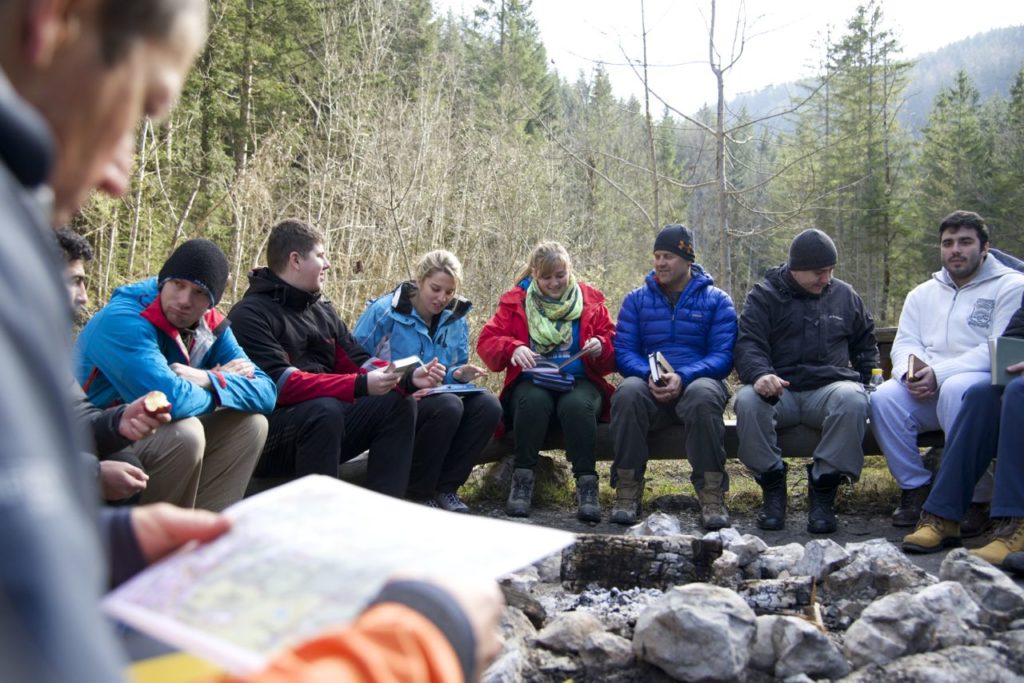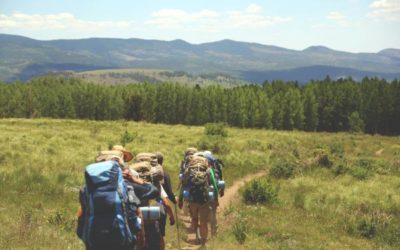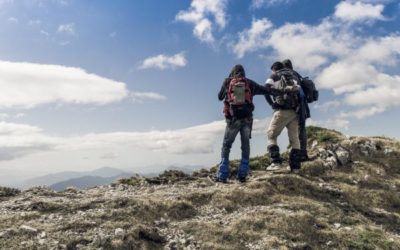God has used the wilderness throughout all of history to tune up and shape leadership skills for his grand purposes in the world.
One of the most straightforward texts in the Bible that illustrates the type of development a person can experience by spending regular time in the wilderness is 1 Samuel 17:34-37. We often talk about what shapes and forms leaders. We attend workshops, read books, find mentors to coach us in leadership skills. Those are all good, but there is also a free leadership skills tune up awaiting all of us… in the outdoors.
The Bible gives dozens of examples how God has used the wilderness as a special place for transforming and developing leaders for his purposes. One of the plainest examples is when young David, a shepherd boy who had been living in the wilderness tending sheep, finds himself in King Saul’s tent sharing his resume of wilderness leadership formation to get permission to represent and defend Israel by facing Goliath:
But David said to Saul, “Your servant was tending his father’s sheep. When a lion or a bear came and took a lamb from the flock, I went out after him and attacked him, and rescued it from his mouth; and when he rose up against me, I seized him by his beard and struck him and killed him. “Your servant has killed both the lion and the bear; and this uncircumcised Philistine will be like one of them, since he has taunted the armies of the living God.” And David said, “The LORD who delivered me from the paw of the lion and from the paw of the bear, He will deliver me from the hand of this Philistine.” And Saul said to David, “Go, and may the LORD be with you.” -1 Samuel 17: 34-37
1. TEND TO OTHERS BY SETTING THE RIGHT PACE
One leadership characteristic that requires practice and discipline is to “pay attention” to others. Tending to others is unselfish. David learned how to take care of sheep from his father Jesse. As a young boy he was given a few sheep, and then as he took care of them and earned the trust of his father, he was given more sheep to take care of. The “Shepherd” metaphor in the Bible is rich throughout the Hebrew Scriptures and the New Testament. A passage from the prophet Isaiah gives one of the clearest definitions of “shepherd leadership” that I know of:
He tends his flock like a shepherd: He gathers the lambs in his arms and carries them close to his heart; he gently leads those that have young. -Isaiah 40:11
God is a shepherd to our souls, and he leads us in such a way that meets all of our needs and sets a pace for us that is doable. Leading a flock of sheep that has a bunch of baby lambs (as illustrated in this passage) takes patience and wisdom. David learned this leadership maxim by spending so much time in the wilderness tending sheep. Spending time with people in the outdoors where they are vulnerable will force (in a good way) those with leadership potential to set aside their own desires and pay attention to the needs of others. You may have to turn back from a peak attempt to tend to the needs of the whole group. You may have to carry someone’s weight to get up the last thousand feet of elevation to your camp, etc. Opportunities to tend to others naturally present themselves in the wilderness because it is a place of vulnerability and group interdependence.
RELATED POST: HOW HAVING SPIRITUAL GUIDES IN YOUR LIFE HELPS YOU FLOAT AT GOD’S PACE
2. DEFENDING OTHERS QUALIFIES YOU TO LEAD
In this passage David tells Saul that he is qualified to take on Goliath because he has experience defending sheep against bears and lions. All of that time out in the wilderness gave him ample opportunity to learn the ways of his sheep’s enemies. He gained a watchful eye for their sneaky tactics. And when they pounced, he carried a big stick and gave it to them. President Teddy Roosevelt described his foreign policy by this phrase: “speak softly, and carry a big stick.” The wilderness teaches us these types of leadership skills, both in a physical sense as well as through the spiritual battles we learn to prayerfully fight. No bear or lion was going to steal one of David’s sheep. Are we that kind of leaders? Does our attitude and posture of defending others qualify you to lead?
RELATED POST: Striving for Last Place – Servant Leadership in Mark 9:33-37
3. RECOGNIZE THE TRUE ENEMY AND DON’T BACK DOWN
As this passage continues, David makes it clear that yes, he is prepared to fight because he learned to fight during his experiences in the wilderness. Yet now he was facing a much more profound foe. He recognized the difference between his preparation and the small battles he had fought up to this point and the epic one he now faced. He was ready to step up to the plate to take on the true enemy of his people, Israel. Yes he was a giant, but David was not intimidated. He was raised up for such a time as this. And he, as a leader, was not going to back down. You and those you are leading have a very real enemy, the Devil.
Be alert and of sober mind. Your enemy the devil prowls around like a roaring lion looking for someone to devour. -1 Peter 5:8
You and I need to be ready to fight him through our prayer lives and the way we use Scripture to defend and lead others:
4. BELIEF IN THE SOVEREIGNTY OF GOD
Probably the most profound statement in this passage is what David then says to Saul next: “The LORD who delivered me from the paw of the lion and from the paw of the bear, He will deliver me from the hand of this Philistine.” He recognized that yes, he had lots of skills from his time being developed as a leader in the wilderness, but ultimately this battle was the Lord’s battle. In God’s sovereignty, David was confident that he would win this battle because God was leading him to it. He trusted in God’s sovereignty, not his own ingenuity or skill. That is a crucial lesson for all of us.
RELATED POST: Is it the Experience that Makes Us Stronger? Or is it God?
HERE IS A FREE LEADERSHIP SKILLS TUNE UP FOR YOUR NEXT WILDERNESS EXPERIENCE:
Set aside some time to climb mountain in the next couple of weeks. From the time on the mountain, ask the Lord to scrape beneath the surface of your soul to reveal these three areas of your life:
1) Where have I come from to this mountain? What is going on in my life right now, and what has been the state of my soul in the past few days and weeks?
2) Where am I right now in my orientation to God? Am being open, honest, vulnerable, and humbly receptive to Him? Or am I closed off, ashamed, feeling distant, or hanging on stubbornly to something that He would like for me to give up?
3) Where am I headed? As I look at the valleys below I can see the path that will take me back to my starting place. When I go back home to the city, what is the spiritual path I am going to take? What kinds of disciplines and habits can I practice to help me enjoy the Lord more fully back down in the valley?
Please share your comments below, I read and respond to every one of them.




